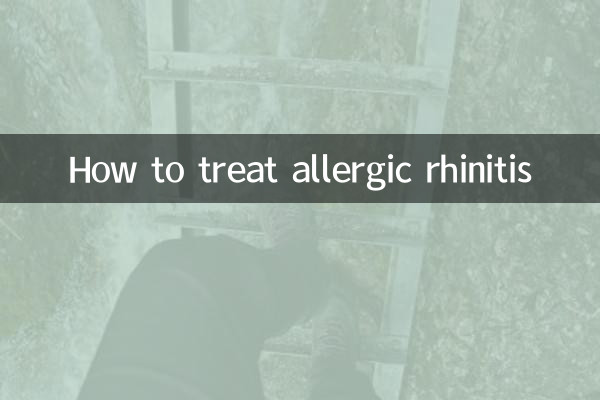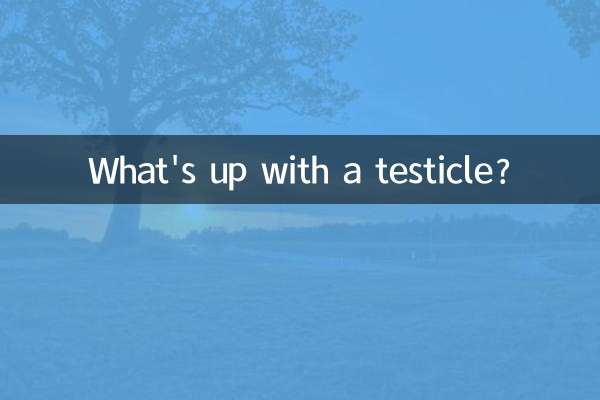How to treat allergic rhinitis
Allergic rhinitis is a common nasal disease, mainly characterized by symptoms such as nasal congestion, runny nose, sneezing and nasal itching. With environmental pollution and climate change, the incidence of allergic rhinitis is increasing year by year. This article will combine the hot topics and hot content on the Internet in the past 10 days to introduce you to the treatment methods of allergic rhinitis in detail and provide structured data for reference.
1. Symptoms of allergic rhinitis

Symptoms of allergic rhinitis mainly include:
| symptom | describe |
|---|---|
| nasal congestion | Poor nasal ventilation, which may affect breathing in severe cases |
| runny nose | Watery nasal discharge, abundant and frequent |
| sneeze | Sneezing multiple times in a row, especially in the morning or after exposure to allergens |
| Itchy nose | Itching in the nasal cavity, which may be accompanied by itching of the eyes |
2. Common treatments for allergic rhinitis
According to recent hot discussions and medical advice, the treatments for allergic rhinitis mainly include the following:
| Treatment | illustrate |
|---|---|
| avoid allergens | Reduce exposure to allergens such as pollen, dust mites, and pet dander |
| drug treatment | Use antihistamines, nasal corticosteroids, decongestants, etc. |
| Immunotherapy | Reduce sensitivity with allergen-specific immunotherapy (desensitization treatment) |
| Traditional Chinese Medicine Treatment | Use traditional Chinese medicine, acupuncture and other methods to regulate your physique |
3. Detailed classification of drug treatment
Drug therapy is one of the main treatments for allergic rhinitis. The following are common drug classifications and functions:
| drug type | Representative medicine | Mechanism of action |
|---|---|---|
| antihistamines | Loratadine, Cetirizine | Blocks histamine receptors, relieving symptoms |
| Nasal corticosteroids | budesonide, fluticasone | Reduce nasal inflammatory response |
| Decongestant | Pseudoephedrine, oxymetazoline | Shrink nasal blood vessels and relieve nasal congestion |
| leukotriene receptor antagonist | Montelukast | Inhibit the release of inflammatory mediators |
4. Preventive measures for allergic rhinitis
The key to preventing allergic rhinitis is to reduce your exposure to allergens. Here are some effective preventive measures:
| Precautions | Specific methods |
|---|---|
| Keep the house clean | Clean regularly and use an air purifier |
| Avoid going out during peak pollen periods | Reduce outdoor activities during pollen season and wear a mask when going out |
| Pay attention to diet | Avoid foods that may trigger allergies |
| Enhance immunity | Regular work and rest, moderate exercise |
5. Traditional Chinese Medicine Treatment for Allergic Rhinitis
Traditional Chinese medicine believes that allergic rhinitis is related to lung, spleen, and kidney dysfunction. The following are some traditional Chinese medicine conditioning methods:
| Traditional Chinese Medicine | effect |
|---|---|
| Chinese medicine conditioning | Use traditional Chinese medicines such as astragalus and atractylodes to nourish qi and stabilize the surface |
| acupuncture therapy | Stimulate specific acupuncture points and regulate the immune system |
| Moxibustion | Warm the meridians, dispel cold, and improve physical fitness |
6. Summary
The treatment of allergic rhinitis requires a combination of methods, including allergen avoidance, drug treatment, immunotherapy and traditional Chinese medicine conditioning. Patients should choose an appropriate treatment plan according to their own conditions and take medication under the guidance of a doctor. At the same time, maintaining good living habits and environmental hygiene can help reduce symptoms and prevent recurrence.
I hope this article provides you with useful information and I wish you a speedy recovery!

check the details

check the details